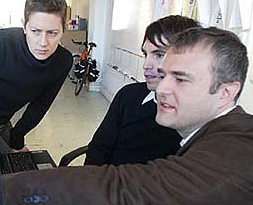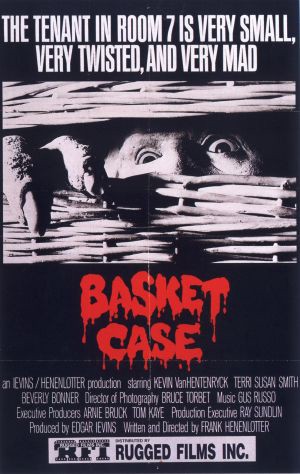Canada Scandalized by Intentionally Scandalous Photographs

Because it’s coming down from Canada, we’re not sure everyone saw this photo series by Jonathan Hobin that just closed in Canada and was published online last month.
No One Really Knows Why Local Man Does Strange Thing: The Nick Denton Story

There are many ways to read today’s New Yorker profile of Nick Denton, a New York City-based man who runs a network of popular websites. I think the best way I’ve found to read it so far is this one: print it out, or to otherwise somehow obtain a printed copy of the piece, and then highlight (perhaps in yellow?) all the quotes by Denton himself. As with all previous Denton profiles-and it’s not a fault of these profiles or the writers, I don’t think!-you will come searching for a “why” and you may again come away frustrated on a quick read. And yet still, when this one is given a sort of slow, math-problem like reading, you feel as if there’s an answer just forming in your peripheral vision. You can sort of see this shiny correct solution hovering there for a second.
31 Days of Horror: "Brain Damage"
by Sean McTiernan
At first, things are pretty rosy for our hero Brian. As long as he brings Aylmer for a “walk,” the charming slug will inject blue juice directly into his brain, giving him odd hallucinations which mostly seem to involve everything glowing like the car at the end of “Repo Man” and the feeling that he’s being covered in neon liquid. However, there’s a sting in the tail. Not only has Brian been neglecting those around him, he has also been helping this mutant slug eat people’s brains. That’s not so great. What follows is Brian’s attempts to give up, the pensioners’ campagain to reclaim Aylmer (depsite their age, they take their brain parasite trippin’ very seriously) and finally Brian’s final surrender and slide towards destruction. Even better news is that the leap in craftsmanship here between “Brain Damage,” Frank Henenlotter’s second film, and his first, “Basket Case,” is quite noticeable. This probably mostly has to do with the six-year gap betweeen the two movies.
While “Basket Case” gets by mostly on winning charm and unrepentant zaniness, “Brain Damage” manages to combine those things with superior production, performances and visual intelligence. It’s not very often a movie featuring an attempt at backstreeet fellatio that ends in brain eating can have the words “best work” applied to it but “Brain Damage” makes a good case for just that.
Unlike lead actor Kevin Van Hentenryck’s oblivously chipper turn in “Basket Case,” this time around Henenlotter gives us a leading man whose strength is acting as opposed to eccentricity. Rick Hearst manages to make Brian a relatable everyman. In a movie that has a serious point but also exploding heads, this is key. No matter how extreme the weirdness being inflicted upon Brian gets throughout “Brain Damage,” you never loose the sense that this is just some poor regular dude and we’d act the same way if put an identical situation.
And if it’s not pretty clear already, that siuation is drug addiction.
Against all odds, “Brain Damage” actually works pretty well as a parable on addiction. All of Henenlotter’s movies tend to have a point to make, in their own way, and Brain Damage goes to great pains to illustrate how amazing drugs can be, how this can makes you oblivious to what’s really going on and that by the time you realise you’re hurting people it can be much too late. It even shows that in the end, you hurt the ones you love the most. The personification of an addict’s needy interior monolgue as a camp slug is spot on, especially when things turn nasty and Aylmer becomes Brian’s master.
Special mention goes to the cold turkey scene. Harrowing as “Trainspotting”’s cold turkey scene was, that never featured a sassy rubber monster and projectile brain hemorrhaging. Step your game up, Danny Boyle.
Still, the star of “Brain Damage” is the monster. Aylmer is unusually charming for a brain-eating monster, possesing the voice of a gently sarcastic theatre instructor and the admonishing, wry sense of humor usually found in wiley grandparents. He’s even got a showtune worked out about his Brain Juice: talk about being all class. A lot of this clearly comes from the man who gave him his voice: legendary tv horror host John Zacherle. Aylmer’s transformation from mischivous uncle into murderous monster in the eyes of Brian happens gradually, his whimsical voice becoming more and more contorted with rage as the film progresses. His method of attack (full-on forehead bites: no funny business) is consistently hilarious, as is his bemused facial expression. Between Aylmer and the heavy handed message, It can often seem like PG Woodhouse decided to write a particularly brutal Goosebumps book.
“Brain Damage” also looks and sounded great. The seedy and blue New York nighttime is a perfect venue for Brian’s multicoloured drug fuges and Joe Renzetti’s Clutch Reiser
and Gus Russo’s score alternates perfectly between trippy and creepy. The quality of the gore and violence also far outstrips “Basket Case,” the practical effects managing to be both gross and hilarious without looking the bad sort of cheap. The film also begins Henenlotter’s tradition of having the last shot of every one of his movies being aggressively weird and shocking, even compared to what came before.
For an intentionally schlocky exploitation movie, “Brain Damage” gets a lot of stuff right it didn’t need to.
Oh and I should mention “Brain Damage” also features one of my favorite cameos in any movie. While on the subway, Brian ends up sitting across from a man holding a large wicker basket. With a padlock on it. Everybody’s got problems.
Sean Mc Tiernan has a blog and a twitter. So does everyone, though. He also has a podcast on which he has a nervous breakdown once an episode, minimum. You should totally email him with your questions / insults/ offers of tax-free monetary gifts.
Breaking! Google Is Skynet! Their Robot-Driven Cars Exist! Game Over, Man

It does not appear to be April 1 by our pitiful human calendars so we are going to presume that this announcement from the former software company turned robotics and human health and interests services industry (AKA our shadow government) called “Google,” in which they reveal that they have been secretly having robots drive cars up and down California, is real and that we’re all going to die.
The Poetry Section: Matthew Poindexter
by Mark Bibbins, Editor

This week, a new poem from Matthew Poindexter.
Dear Landscape with Blah Blah Blah
Thank you for the lunch last Sunday
at El Rey del Taco, where we each ate
pescado frito entrées, then split a dish
of crippling self-doubt for dessert.
Doubt can be no course but the last, can it?
Thank you for telling, between bites
of fish with lime and garlic sauce, the story
of the son who became so angry at his mother
for remarrying, he burned her signed
first edition of Catcher in the Rye.
I think you’d feel a little better if you torched
someone else’s stuff-just as long as it’s not mine.
Thank you for agreeing with me about whom
amongst our friends would be the best
to sleep with, and who doesn’t make the cut.
Thank you for proposing we make some rules
to follow in our poems: no more “Landscape
with Blah Blah Blah” in the title. No more
epistolary verse addressing inanimate objects:
“Dear Rutabaga,” “Dear Pitcher’s Mound,”
“Dear Food Stamp Act of 1964.” My offer
to ignore the second rule-if you promise me
you’ll break the landscape title one-still stands.
You said, “Breaking rules is why my life
is falling apart.” “But I love to read
your landscape title poems!” I said. You said,
“I truly doubt it.” I didn’t reply,
just watched you sign the check, because I knew
you wanted that to be the final word.
Yet to myself, I wished the biggest mistake
we could make was to break a silly rule.
I wished the worst thing anyone had ever done
was judge their friends purely for their beauty.
If only the most hurtful crime we committed
against those we love, those who love us back,
was to burn their most cherished possession.
Matthew Poindexter is a JD candidate at the University of North Carolina School of Law. His writing has appeared in a wide range of publications, including Best New Poets 2009.
You may contact the editor of The Poetry Section at poems@theawl.com.
Would you like to read more? Visit our vast archive of poetry!
Famous Authors as Café Customers
by Rachel Kincaid

It was noon on a Saturday. It was ninety-five degrees, and there was a line out the door, and the previous customer had been a tiny elderly Armenian woman who had been impossible to understand, and so obviously the person next in line was my former undergraduate thesis advisor.
“I had no idea you worked here!”
“Oh, hi, [redacted]! So nice to see you again!”
“You too! This is such a lovely little place, you must love working here.”
My advisor was a fairly famous and lauded novelist who had successfully moved out of the realm of “ethnic” literature into what is regarded as generally good American literature. Her books dealt with this, with being American, but also with being “ethnic.” She was very short and very imposing, and although I was always aware that she had a family, it was difficult to picture that while she talked about speaking on panels with Salman Rushdie. But now they were here, two girls who looked like American Girl dolls and a husband with a beard and affectionate eyes.
“What can I get for you?” My advisor and her family did not respond. They were looking at the menu.
“I’d like one of those,” the husband said, pointing towards a tomato-and-goat-cheese tart. The food where I work is Middle Eastern-ish; people are willing to pay $4 for tarts because they’re “ethnic.”
“Okay,” I said. “Would you like this for here or to go?” He didn’t answer.
“I’d like a tomato and goat cheese tart,” my advisor said.
“I just ordered one of those,” her husband told her. She considered this.
“Well, I want one too,” she said.
“It has bacon in it, too. Just so you know.” We had never talked about food while she was my advisor, but I felt vaguely like she might be a vegetarian. A lot of people are.
“That’s fine,” she told me.
“Would you like this for here or to go?”
“For here.” I put two tarts on two separate plates.
“So is this your summer job?” my advisor asked as I handed them to her over the register.
“No,” I said. I wanted to explain further, but everything I could say to clarify sounded pathetic. “This is my real job,” or “this is all I do now.” I had gone to a very expensive private school. My advisor had left her teaching position at that school in the middle of my thesis because the university didn’t want to give her a year off to start a new book.
“Oh,” she said.
I had never gotten along particularly well with my advisor, and assumed that this was because I wasn’t smart enough. When I told her I wasn’t sure how to structure a work of this length, she told me that with fiction there was a center that was an iron ring in the sea, and that you had to always watch that iron ring or else the work would fall apart. “Oh,” I said.
“Is there anything else I can get for you?” My advisor and her family ordered three items from the kitchen, and paid with a card. I printed out their receipt, and told them “Your order number is 37.” My advisor walked away from the counter, and her husband said “Thank you.” Neither of them left a tip.
My thesis had won an award that came with a $100 check; everyone else who wrote a fiction thesis also won an award, as there were four departmental awards and four thesis writers. The section I had read aloud at my defense had to do with child sexual abuse. I had given my mother a copy of the full work, and she had read parts of it.
After twenty minutes, I found a coworker and told them I needed someone else to take over on register. I leaned up against the table behind the counter and hoped I looked sick so that someone would ask me if I needed a break.
“My thesis advisor from college just came in,” I said.
“Oh really?” my coworker asked. He was from California, and had been a champion cyclist before he started smoking too much weed.
“She asked if this was my summer job.”
“Ha,” he said.
“And she didn’t tip.”
“Wow,” he said. “That’s cold.”
“Yeah,” I said. After I got off work that day I was so depressed with the state of my life I had to go to a thrift store and buy a gray sweater for ten dollars. I checked on Amazon later, and her new novel comes out this month. I will not buy it, because I liked her short stories better anyways.
Rachel Kincaid spends most of her time writing about Katy Perry and Lady Gaga covers, which is weird when you think about how expensive her degree was. She also has a blog and twitter, duh.
Photo by Axel Kuhlmann from Flickr.
Band Of Horses Cover Cee-Lo's "Georgia"

“This began as a very random idea I had on my dad’s patio after we watched our beloved Georgia Bulldog football team get robbed of a win at the hands of the referees and LSU last year. I knew I wanted to pay homage to my favorite team in song but didn’t have any idea how to begin. Once I heard Cee Lo’s ‘Georgia,’ I was immediately smitten and figured that’s as good as any tribute to any state I’ve ever heard. It wasn’t until I heard his cover of our song though that it occurred to me: Duh, we should return the favor. Incorporating the Redcoat marching band was just the icing on the cake!”
–Band of Horses frontman Ben Bridwell explains how he decided to cover “Georgia,” a track from Cee-Lo’s upcoming album, with the University of Georgia marching band.
Cee-Lo’s cover of Band of Horses’ “No One’s Gonna Love You” will be on the new album, too. And the two covers are being sold as a vinyl-only split single, available in December. It’s so nice, it’s like these guys are having their own private Peter Gabriel album!
Three Big Political Races To Fret About This Weekend
In your “political things to worry about” pile this weekend: will California’s Jerry Brown actually not calling Meg Whitman a “whore” to “special interests” give that terrible woman a boost in the polls? And will the Democratic party force Florida Democratic candidate Kendrick Meek out of the Senate race in favor of that horrid Charlie Crist? And will Delaware Republican candidate for Senate and former witch Christine O’Donnell finally flip out and kill us all? Stay tuned-these three races get worse before they get better (or get again much worse).
31 Days of Horror: "Basket Case"
by Sean McTiernan
Frank Henenlotter is a cult figure within a cult genre and it’s about time he be celebrated. While other 80s horror luminaries like Sam Raimi or Peter Jackson went on to devastate the box office and make a huge amount of money, Frank Henenlotter stayed with weird cinema. He dedicated his life to it, spending 16 years working with Something Weird Video, releasing the weirdest movies possible. Hennenlotter then returned to directing. And like fellow god-tier goresmith Stuart Gordon, Henenlotter stuck to the fake-blood and rubber monsters for all six of his films to date.
Too rare to live, too weird to ever attain mainstream success. Because although there’s a lot to love about Henenlotter’s movies, their weirdness trumps anything else going on.
So I’ve decided to dedicate the next five days of our 31-day tour through horror movies to examining each of Henenlotter’s movies and why there’s a great case for watching each one. We’ll see the common threads that run though each of his movies and how his approach makes him unique among schlock jocks. Well, I’m hoping we see that stuff anyway, I just think the man who made both “Brain Damage” and “Frankenhooker” needs to be honoured. Handily his movies get progressively more bizarre and his career continues-crowned by his latest and weirdest movie: “Bad Biology.” Nothing else on this list comes close to “Bad Biology” in terms of bizarre tone, back story, visuals and outrageous premise so it’s good we get to follow the journey to what lead one man to make such a commitedly gonzo movie.
But I am jumping ahead of myself. We begin at the beginning: “Basket Case,” Henenlotter’s debut and still his most famous movie. In “Basket Case” two conjoined twins, Duane and Belial, are separated in their early teens because Belial is an over-sized fist with arms and teeth hanging off the side of Duane and most people think that’s inappropriate. Their father has resented Belial ever since the twins’ birth caused the death of their mother and he is seen screaming insults into the baby carriage. This kind of subtlety is one of Basketcase’s trademarks, evidenced by Belial’s discovery he can get back at this father by murdering him with an elaborately rigged electric saw-blade. Yes, this is the smoldering, unspoken intensity of a Jane Austin novel.
The movie follows Duane and Belail, now grown-ass men, as they travel to New York to murder the doctors their father hired to cut them apart. And because Belail is not really that great at the whole “conventional society” thing, Duane keeps him in a locked wicker basket.
“Basket Case” was made for very little and also with the express intention of being seedy. It shows. The movie takes place in a hotel that drips real grime. The special effects are, to be charitable, enthusiastic at best. And the acting. My God, the acting is amazingly bad. Sometimes people deliver lines as if they’re in the middle of passing out. But because it’s not on purpose and all of the characters seem like they’d be odd people in real life anyway, it’s actually damn charming. This is what Henenlotter’s movies all share: a love of freaks and a uniformly charming and earnest presentation. There is none of the mean-spirited snark that crawls from every Troma movie, aggressively acknowledging how bad the film is so you can’t criticize it first. Hennenlotter’s movies are gross and weird, but they’re also love letters to exploitation cinema, knowingly wonky and adorably gonzo.
For instance Duane’s relationship with receptionist Sharon. There’s no reason to fall for the creepy Duane but she totally does. And even when he covers her with a sheet and hops her off a wall, she still comes back to him (to “hop someone off something” is Irish slang for throwing them bodily at something-you’ve learned something today). This is a totally odd and unrealistic relationship of course, but most relationships are just that in my experience.
Sharon and Duane’s time together is just one of the brief personal interactions in “Basket Case” that almost amount to Hughesian vignettes: just a minute or two where the movie takes a bit of a break from all the murder (or bunking school with your imaginary friend if you’re talking John Hughes) to show that people are people. This off-kilter charm is of particular use when it comes to Kevin Van Hentenryck, who plays Duane. Van Hentenryck is another example of one of my favourite schlock horror tropes: the leading man who can’t lead, follow or get out of the way.
Watching Van Hentenryck gurn and squeak his way though “Basket Case” is genuinely hilarious. The man’s emotions catapult from weird simpering to flighty mania, all in the space of a sentence. His hair, which looks like a someone combined every haircut to grace to the front row of a Whitesnake concert into some sort of super white rock fro, does most of his acting for him. And yet still the movie is carried by Belial: the man in the basket.
By the end of the movie, Belial is as despicable as those who separated him from his brother. One assumes a big part in his descent into evil is the shame he felt, being regarded as a animal responsible for his mother’s death, a canker on the side of his brother. The other large part probably being the fact that he looks like a feral testicle. Personally, I’d be raging if I was a poorly animated feral testicle, and who among us can say any different?
Belial’s journey over the course of the movie from avenging assassin to physically improbable rapist (he has no lower half, what exactly was going on there?) is a tragic one. Although he looks like steroid-pumped dumpling and moves around using some of the worst stop-motion animation I’ve ever encountered, you still can’t help but fear for the guy. Sure he attacks people. (These people incidentally always seem to be holding him in place and they only develop cuts and bruises after the attack, not during… that’s weird right?) But until the end of the movie, these are evil scummy people who have attacked his family in some way. Belail is a family man to the core. And corny as the effect is, the anguished human scream they give him and the occasional good camera angle do help to make him a genuinely tragic (and not just molded plastic) figure.
Even his eventual descent into a rapey murder fugue comes in tandem with his brother’s late sexual awakening. From the second his brother goes on a date with the hapless Sharon, Belail is insane with rage. The poor man (blob?) only had his brother for companionship and although the doctors could only medically separate them, Belail is conscious of the fact it will take sexual desire to sever the emotional tie between them. In this way “Basket Case” can be interpreted as a story about changes how puberty and growing up can change friendships and how those most emotionally stunted will be most hurt. If this seems pretentious, and it probably should, bear in mind something that looks like a giant angry ballsack spends the last 10 minutes of the movie pawing women then responding to their horror with violence. Between this and the disgusting father, it’s not that big of a stretch to conclude “Basket Case” is about how bad parenting and sexual frustration can lead to emotionally stunted thugs. Sure, it’s not the deepest statement in the history of cinema but it’s infintely more complex than “Suburbia Is Mad Weird, Yo” or “Holocaust: Bummer” and those movies win Oscars.
So there you have it, there first Henenlotter movie: a fake-blood squirting Greek tragedy of minuscule proportions. It only gets queerer from here.

Sean Mc Tiernan has a blog and a twitter. So does everyone, though. He also has a podcast on which he has a nervous breakdown once an episode, minimum. You should totally email him with your questions / insults/ offers of tax-free monetary gifts.

